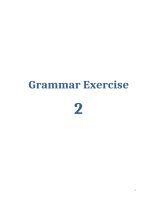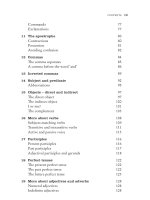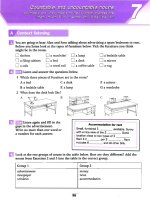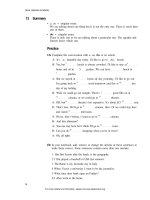UEfAP grammar noun based exercise 2
Bạn đang xem bản rút gọn của tài liệu. Xem và tải ngay bản đầy đủ của tài liệu tại đây (97.3 KB, 1 trang )
UEfAP Grammar: Nounbased Exercise 2
Grammar in EAP
Nominal groups
Exercise 2
Read the following text. Notice how the word "need" is used. Notice how it is modified (premodified and
postmodified) and how the nominal group it is the head of functions in the clause.
The fundamental human need to belong comes from the desire to associate with others, to cooperate,
to accept group norms. However, the Stanford Prison Experiment (SPE) shows that the need to belong
can also be perverted into excessive conformity, compliance, and ingroup versus outgroup hostility.
The need for autonomy and control, the central forces toward selfdirection and planning, can be
perverted into an excessive exercise of power to dominate others or into learned helplessness.
Consider three more such needs that can cut both ways. First, needs for consistency and rationality
give meaningful and wise direction to our lives. Yet dissonant commitments force us to honor and
rationalize wrongheaded decisions, such as prisoners remaining when they should have quit and
guards justifying their abuse. Second, needs to know and to understand our environment and our
relationship to it lead to curiosity, scientific discovery, philosophy, the humanities, and art. But a
capricious, arbitrary environment that does not make sense can pervert those basic needs and lead to
frustration and selfisolation (as it did in our prisoners). And finally, our need for stimulation triggers
explorations and adventurous risk taking, but it can also make us vulnerable to boredom when we are
placed in a static setting. Boredom, in turn, can become a powerful motivator of actions as we saw with
the SPE night shift guards to have fun with their "playthings."
(The Lucifer Effect, by Philip Zimbardo, 2007, Rider Books)
Press this button to check your answers: An Answer
/>
1/1









